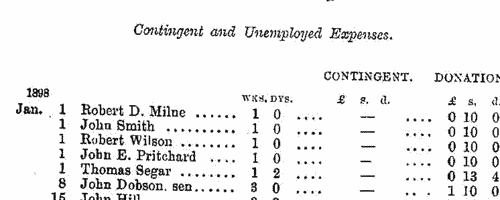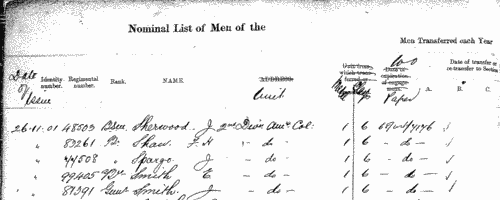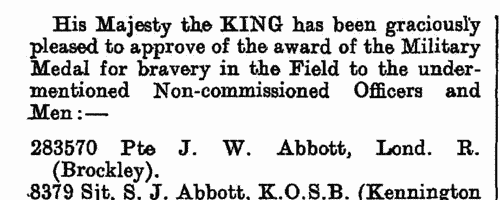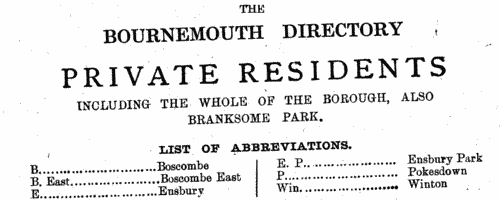Add this eBook to your basket to receive access to all 85 records. Our indexes include entries for the spelling evenden. In the period you have requested, we have the following 85 records (displaying 61 to 70): These sample scans are from the original record. You will get scans of the full pages or articles where the surname you searched for has been found. Your web browser may prevent the sample windows from opening; in this case please change your browser settings to allow pop-up windows from this site. Steam Engine Makers in England
(1898)
The report of the Steam Engine Makers Society includes accounts of disbursements by all their branches (mostly in England), covering members' sickness, travel and funeral expenses. | Sample scan, click to enlarge

| Unclaimed Naval Prize Money
(1855-1902)
Various prize moneys were awarded to officers and men who served on board her Majesty's ships. For one reason or another a substantial number of these prizes, from as little as a shilling or two to as much as many pounds, remained undistributed by 1902, when this comprehensive list of the unclaimed moneys was printed: it lists unclaimed shares of prize money, slave and pirate bounties, salvage awards, parliamentary grants, gratuities and other moneys distributed by the Admiralty 1855 to 1902, but which omits moneys for service on the China Station during the war of 1856 to 1880, and special gratuities for service in Egypt (1882), Soudan (1884) and Soudan and Nile Expedition (1884-1885), for which there are separate indexes. In each case the sailor's name is given first (surname, then christian name or initials); rank or rating; ship in which serving at time of capture or award; and the amount due. | Sample scan, click to enlarge

|  London Metropolitan Police
(1892-1902) London Metropolitan Police
(1892-1902)
The London Metropolitan Police Register of Joiners (MEPO 4/336) lists policemen joining the force 1 January 1892 to 23 June 1902 (warrant numbers 77319 to 88811). The register is alphabetical, in so far as the recruits are listed chronologically grouped under first letter of surname. It gives Date of Appointment, Name, Number of Warrant, Cause of Removal from Force (resigned, dismissed, promoted or died), and Date of Removal. A final column of 'Remarks' is largely blank, but occasionally gives an alias or a cross-reference to another warrant number. | Sample scan, click to enlarge

|  British artillerymen fighting in South Africa
(1899-1902) British artillerymen fighting in South Africa
(1899-1902)
The Queen Victoria's South Africa Medal was awarded (after her death, in the event) to all who had served honourably in the various campaigns in the Boer War. Returns were made from each unit, and consolidated into nominal roll, of which this is the one for the Royal Artillery. Confusingly, the ledgers used had originally been printed for a register of men transferred (or re-transferred after mobilization) to 1st Class Army Reserve. All the original column headings were therefore struck through, and the roll was prepared with this information: Date of Issue; Regimental Number; Rank; Name; Unit; Medal (a 1 indicating that a medal was awarded); [number of] Clasps; the reference to the source in the original returns, usually starting with AG for papers in the hands of the Adjutant-General, and 68/Art/ for the Royal Artillery records. The final column, normally left blank, was occasionally used for explanatory remarks. | Sample scan, click to enlarge

|  Queen's South Africa Medal: Royal Field Artillery: 77th Battery
(1901-1905) Queen's South Africa Medal: Royal Field Artillery: 77th Battery
(1901-1905)
The nominal roll for the Queen Victoria's South Africa Medal - awarded (after her death, in the event) to all who had served honourably in the various campaigns in the Boer War - was compiled from these returns from the individual units. Two sets of form were completed. The main one, as in the sample scan, dates from 1901 and gives regimental number, rank, and full name (surname first), followed by a series of columns relating to different actions - Belmont, Modder River, Paardeberg, Dreifontein, Wepener, Johannesburg, Diamond Hill, Belfast, Wittebergen, Defence of Kimberley, Relief of Kimberley, Defence of Mafeking, Relief of Mafeking, Cape Colony, Orange Free State, Transvaal, Rhodesia, Talana, Elandslaagte, Tugela Heights, Defence of Ladysmith, Relief of Ladysmith, Laing's Nek, and Natal; each entitled the man to a separate clasp to the medal, and a tick or a Yes in the appropriate column indicates the man's actual physical presence in that battle. A final column for remarks is important in those cases where the man was no longer in the unit, by removal, death or desertion. The second form that sometimes occurs was returned in 1905, and covers men entitled to the Second South African War Medal and Clasps. It lists men by number, rank and name, checks whether they had claimed the Queen's South Africa Medal, and then enquires as to their suitability as to three Colony Clasps, which could be awarded for service in the Cape, Orange Free, or Transvaal; whether entitled to Date Clasps (South Africa 1901 and South Africa 1902); whether also entitled to the King's South Africa Medal; any other corps in which served in South Africa; and remarks (such as becoming non-effective, forfeiture, &c.) WO 100/143 | Sample scan, click to enlarge

| Blind Annuitants
(1912)
The General Register of Blind Annuitants for 1912 listed nearly 6000 recipients of annuities from various charities and trusts in the British Isles. This index sets out the same information again in tabular form, giving: register number; surname; christian name or initials; full address; year of birth or age; amount of annual payment; year of appointment; recurrence (if renewed: yearly, weekly, or monthly); and abbreviated name of the charity. Many individuals were receiving sums from more than one source. Where (n) is given after the surname, it indicates a pension granted since the last previous edition; (+) shows an increase in pension; (-) a decrease. | Sample scan, click to enlarge

| Military Medal
(1918)
King George V approved the award of the Military Medal for bravery in the Field to these non-commissioned officers and men 6 August 1918. | Sample scan, click to enlarge

| Chemists and Druggists
(1919)
The official register printed under the direction of the Pharmaceutical Society of Great Britain pursuant to the act of 31 & 32 Victoriae, cap. 121 (An Act to Regulate the Sale of Poisons, and Alter and Amend the Pharmacy Act, 1852) comprised two sections:
1.The Register of Pharmaceutical Chemists, giving date of registration, number of examination certificate, full name (surname first, in capitals), and residence;
2. The Register of Chemists and Druggists, giving date of registration, full name (surname first, in capitals), residence, number of examination certificate (major or minor), and qualification. | Sample scan, click to enlarge

| Residents of Bournemouth
(1934)
Kelly's Directory of Bournemouth and Poole for 1934 includes this section listing private residents in Bournemouth, Branksome Park, Boscombe, Boscombe East, Ensbury, Ensbury Park, Pokesdown and Winton. | Sample scan, click to enlarge

| Residents of Poole, Longfleet and Parkstone
(1934)
Kelly's Directory of Bournemooth, Poole, Parkstone, Etc. includes this list of private residents in Poole, Longfleet and Parkstone (inclusive of Branksome). An asterisk before a name indicates a Parkstone postal address; a dagger, Bournemouth.
| Sample scan, click to enlarge

|
Research your ancestry, family history, genealogy and one-name study by direct access to original records and archives indexed by surname.
|












